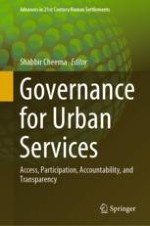2020 | OriginalPaper | Chapter
Developing Capacities for Inclusive and Innovative Urban Governance
Authors : Adriana Alberti, Mariastefania Senese
Published in: Governance for Urban Services
Publisher: Springer Singapore
Activate our intelligent search to find suitable subject content or patents.
Select sections of text to find matching patents with Artificial Intelligence. powered by
Select sections of text to find additional relevant content using AI-assisted search. powered by
